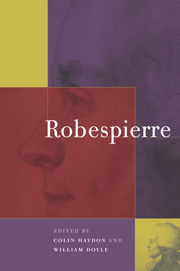2 - The Robespierre problem
Published online by Cambridge University Press: 14 January 2010
Summary
‘The Revolution’, Francois Furet reminded us, ‘is an epoch without great men.’ Robespierre, with all his flaws and shortcomings as a man, fits the pronouncement perfectly. He was unworldly, resentful, vain, egotistical, susceptible to flattery, contemptuous of or indifferent to all the social pleasures except conversation, guarded and suspicious, his innermost self carefully shielded by ancien régime manners. As a politician he was equally compromised, being inflexible, unforgiving, ill at ease in public, secretive, stiff and pedantic as a speaker (with an unpleasing and not very powerful voice), lacking the common touch, preoccupied. As a political and social thinker he was annoyingly fastidious, adroit and closely focused rather than original, prone to substitute Jacobin rhetorical formulae for logical steps, obsessively self-regarding, too tied to circumstances to formulate general principles (or disentangle those he held from the personalities and issues of the moment), enthralled by abstractions. Yet he imposed, then imprinted, himself on the Revolution. No other figure of the Revolution (save the special case of Napoleon) could provide the focus and the fulcrum for so many aspects of that tremendous event. He remains fascinating partly because he was (and is) so controversial, partly because he was (and is) so elusive, at least to the biographer, but mostly because he managed for a few short but significant years to convince his contemporaries that his life, his words, his very self were indistinguishable from the Revolution. He was its embodiment. He somehow was the Revolution incarnate, an act of faith that lay at the very centre of his thought and effectiveness.
- Type
- Chapter
- Information
- Robespierre , pp. 17 - 34Publisher: Cambridge University PressPrint publication year: 1999
- 2
- Cited by



